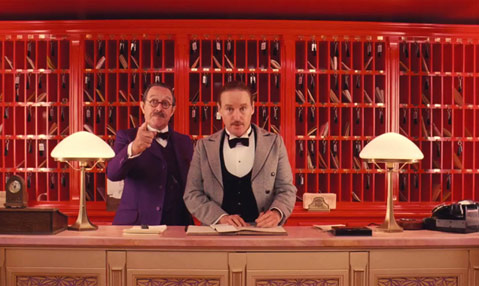Review: The Grand Budapest Hotel
Ralph Fiennes, Tony Revolori, and Willem Dafoe star in a film written and directed by Wes Anderson.

Wherever he goes in this wide world, it’s a sure bet Wes Anderson will find himself. Just think of all the places he’s been: from a boys’ boarding school to the bottom of the ocean, from a piney island in New England to the middle of a Roald Dahl animal allegory. And if someone screened clips from Bottle Rocket, or The Fantastic Mr. Fox, the average filmgoer would take about nine seconds to identify the film as Anderson’s — which is a good thing. We all need more personal filmmaking, and we love all the touches, from his familiar troupers like Owen Wilson and Bill Murray to the characteristic radar colors and childlike finesses from his unusually challenged artist protagonists. Anderson just has to step up to the plate and audiences will rally.
But sometimes the exotic idiosyncrasies overwhelm his topic. Remember how much more quirky than informative The Darjeeling Limited was? It happens in this film, too. It’s unmistakably part of the canon, but only secondarily the meditation it intends on the vicissitudes of memory. The film is told completely in flashback. And it’s not even much concerned with the faded glory of the Hungarian hotel of its title.
Make no mistake: Grand Budapest is beautiful in all the right ways. The color-coded hostelry (a model, currently on display in the ArcLight Hollywood theater lobby) nestles in a snowy kingdom that’s more picture book than travelogue. The film’s local newspaper is called the Trans-Alpine Yodel. And the cast completes the quirky scenery with great presences, like bad guys Willem Dafoe and Adrien Brody and glorious innocents Saoirse Ronan and Jude Law. Many cameos bring all the stock company into the film.
What’s missing is any real life in the hotel, though death and mayhem pop up on occasion. Anderson never takes us on one of his patented set tours before he launches into his whimsical plot that’s all quirks and turns of comic phrase, and there’s no big payoff either. You will laugh and maybe cry; it’s a film that should not be missed, but it’s no masterpiece like Rushmore or even Moonrise Kingdom was. Go for the Budapest, but stay for the chance to see Anderson’s mind at work.



